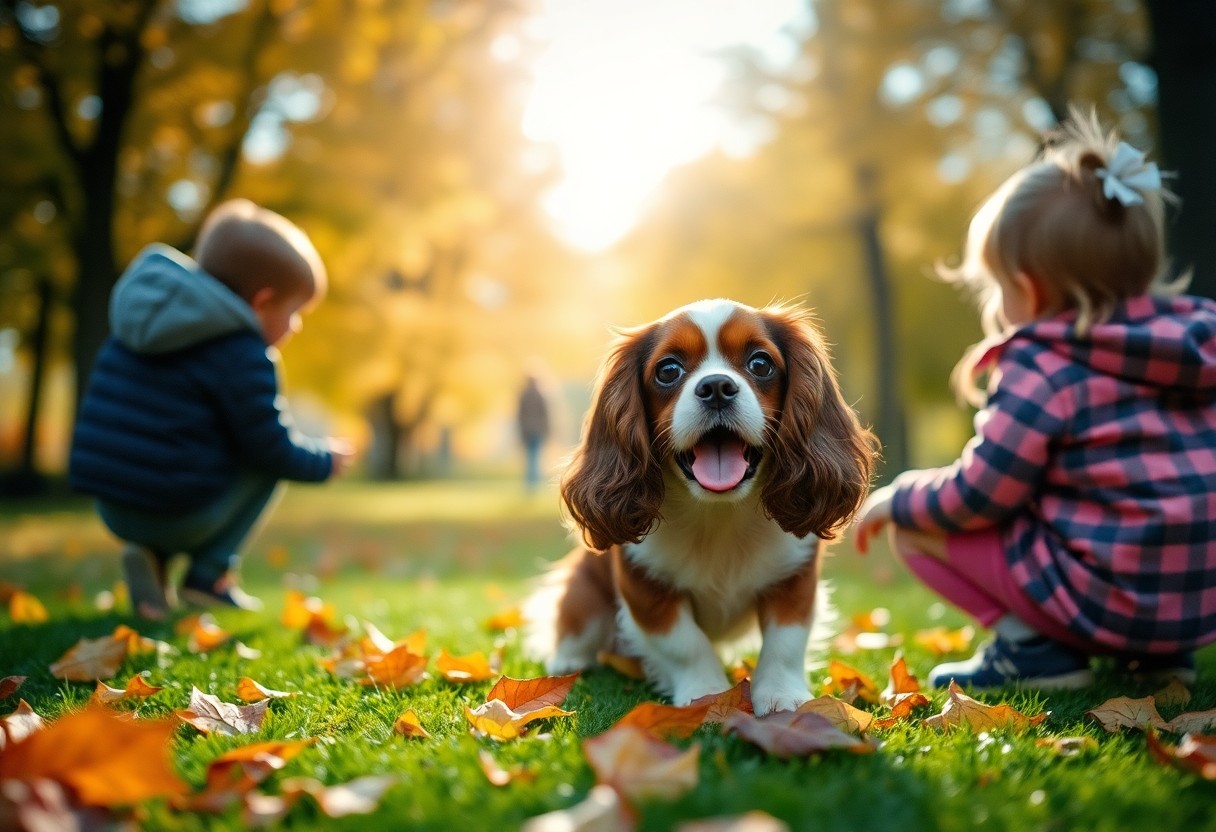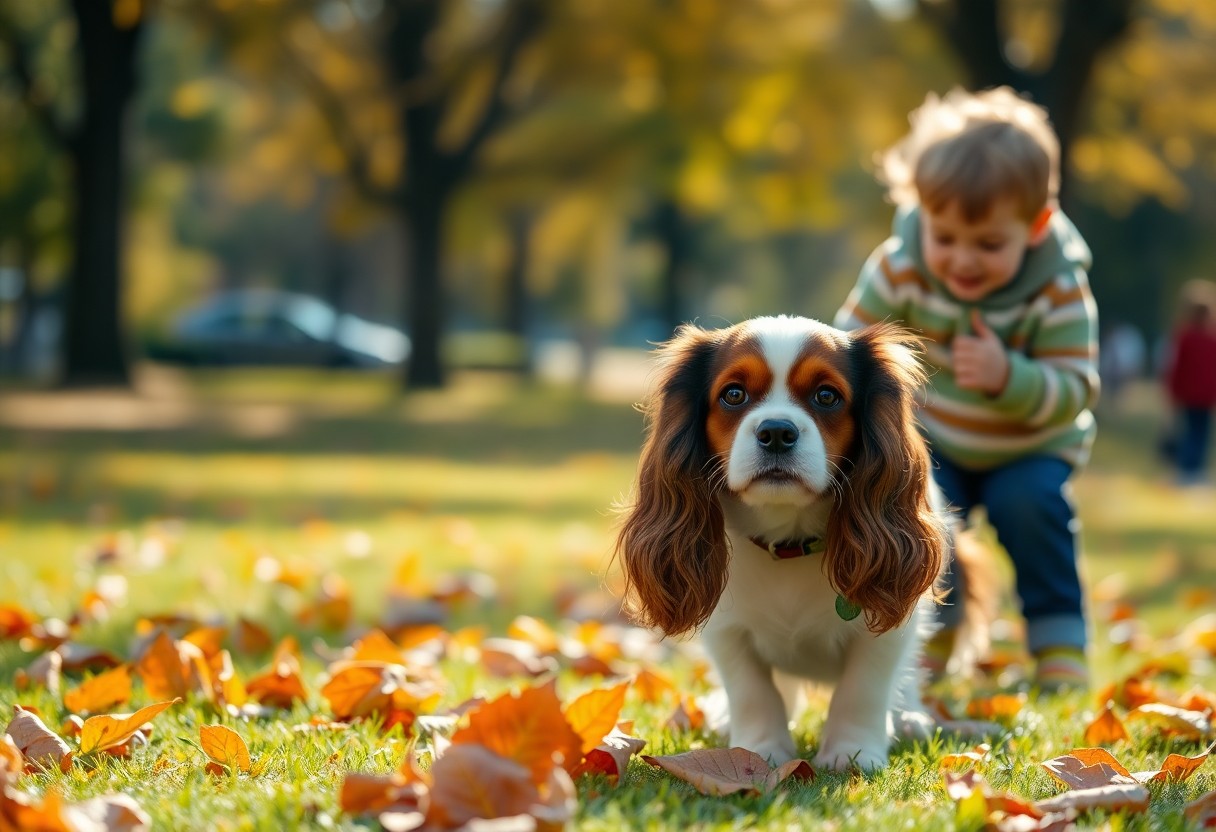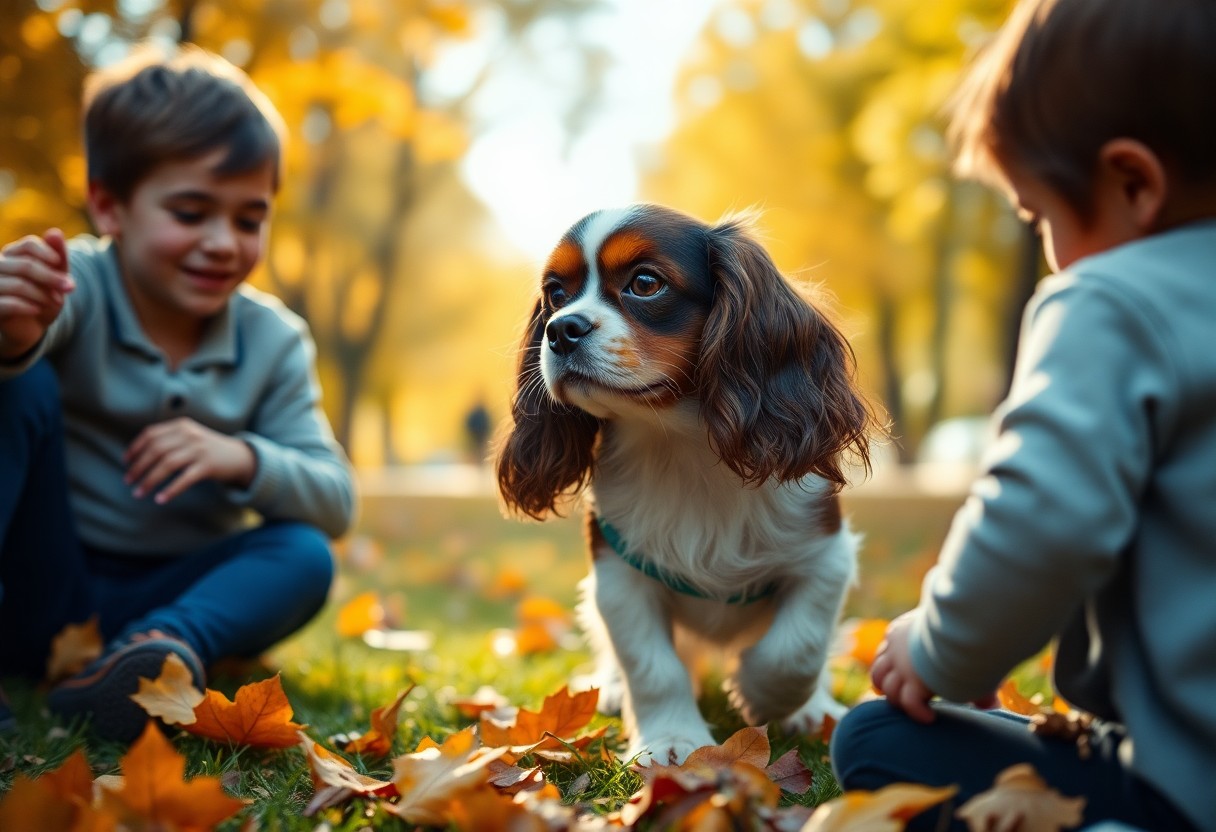Just as you consider adding a furry friend to your family, understanding the temperament of a Cavalier King Charles Spaniel is key. These dogs are known for their affectionate nature and gentle disposition, making them ideal companions for families. They tend to get along well with children and other pets, fostering a warm household environment. However, be mindful of their sensitive side; they can become anxious without proper socialization and training. By knowing their traits, you can ensure a harmonious life together.
Key Takeaways:
- Cavalier King Charles Spaniels are known for their gentle and affectionate nature, making them excellent companions for families.
- They are typically good with children and other pets, showcasing a friendly demeanor that promotes harmony in multi-pet households.
- The breed is highly social and thrives on companionship, necessitating regular interaction with family members to avoid feelings of loneliness or anxiety.
- Training these dogs can be relatively easy due to their eager-to-please attitude, but consistency and positive reinforcement are vital.
- Cavaliers have moderate energy levels, enjoying playtime and daily walks, which can be a delightful way for families to bond with them.
- They may be prone to separation anxiety if left alone for extended periods, emphasizing the importance of family presence in their daily lives.
- Regular grooming is crucial due to their long, silky coats, but their calm demeanor makes grooming sessions a pleasant experience for both the dog and family members.
Overview of Cavalier King Charles Spaniel Temperament
The Cavalier King Charles Spaniel is known for its gentle and affectionate nature, making it an ideal companion for families. Their loving demeanor, combined with playful energy, creates a bond that encourages strong relationships with both adults and children. As a breed that thrives on human interaction, these dogs often seek companionship and can easily adapt to various family dynamics.
General Personality Traits
Temperament is one of the defining characteristics of the Cavalier King Charles Spaniel. These dogs are typically friendly, affectionate, and eager to please. You will find them to be obedient and quick learners, showcasing an innate desire to make you happy. Their playful and social nature allows them to fit seamlessly into family life, creating lasting memories for you and your loved ones.
Adaptability and Sociability
Along with their charming personality, Cavaliers are highly adaptable and sociable. They thrive in various living situations, from apartment settings to larger homes, adjusting easily to your family’s lifestyle. Their gentle disposition makes them great companions for children and other pets, fostering a harmonious environment in your household.
Cavalier King Charles Spaniels are extremely sociable dogs, requiring regular interaction and engagement with their family members. They are not suited for prolonged periods of isolation, as they can become anxious or depressed without companionship. Their adaptable nature allows them to blend well into most situations, whether it is an active family with kids or a quieter home. Their friendly attitude towards strangers and other animals makes them excellent candidates for households with multiple pets, as they tend to thrive on social connections.
Interactions with Children
Assuming you’re welcoming a Cavalier King Charles Spaniel into your family, you’ll find that they typically form strong bonds with children. These charming dogs are known for their gentle nature and affectionate temperament, making interactions with kids a delightful experience. Their friendly disposition encourages playful engagement, and they thrive on companionship. It’s vital to supervise all playtime to ensure that both your child and your pet have a positive experience together.
Playfulness and Affection
At the heart of a Cavalier’s personality is their playfulness and affection. They enjoy games of fetch, cuddling, and spending quality time with your little ones. Their joyful demeanor often brings laughter to your home, making them a beloved member of the family unit.
Protective Instincts
An important aspect of Cavalier King Charles Spaniel temperament is their protective instincts. While these dogs are friendly and loving, they also possess a natural tendency to be watchful over their families. They may alert you to strangers or unusual sounds, providing an extra layer of security.
Protective Cavalier King Charles Spaniels are known to be vigilant companions, ensuring that your household feels safe. Their watchful nature can be a reassuring presence, especially around children. However, it’s key to balance their protective instincts with positive socialization to prevent any over-protectiveness. By introducing them to various environments, sounds, and people, you teach your dog that not every stranger poses a threat. This way, your Cavalier can enjoy their role as a loving family member while maintaining a well-rounded temperament.
Compatibility with Other Pets
Keep in mind that Cavalier King Charles Spaniels are typically friendly and adaptable, making them a great addition to a multi-pet household. They usually get along well with both dogs and other animals, but their social skills can depend on early socialization and individual personalities. Providing a loving and supportive environment will help ensure that your Cavalier can thrive alongside your other pets.
Social Behavior with Dogs
About Cavaliers, their sociable nature makes them very compatible with other dogs. They enjoy playdates and engaging interactions, which often leads to delightful companionship. If you introduce them to other dogs at a young age, you can foster positive social development, ensuring they can be a gentle and loving friend to their canine counterparts.
Relationship with Cats and Other Animals
An experienced Cavalier owner knows that these dogs can often coexist harmoniously with cats and other small animals. Their gentle temperament typically allows them to engage positively with feline friends, although some supervision is advised to maintain harmony in the household.
Behavior with cats and other pets can vary based on individual temperaments and experiences. Cavaliers are generally non-aggressive and may exhibit a playful demeanor when interacting with cats. It’s important to monitor their interactions, especially in the early stages. While a Cavalier may have a natural curiosity towards smaller animals, early training and socialization will promote a peaceful coexistence. Always ensure that your pets have their own space to retreat to, as this can help reduce any potential stress or conflict.
Training and Obedience
Unlike many dog breeds, Cavalier King Charles Spaniels are eager to please, making them relatively easy to train. Their friendly disposition allows them to bond quickly with family members, which enhances their responsiveness during training sessions. However, consistency and positive reinforcement are key elements to help shape their behavior effectively.
Responsiveness to Commands
On the whole, Cavalier King Charles Spaniels display a high level of responsiveness to commands. Their affectionate nature typically drives them to seek your approval, which can facilitate quicker learning and understanding of basic commands like sit, stay, and come. This eagerness makes training a rewarding experience for both you and your pet.
Challenges in Training
Training can sometimes present its challenges with Cavalier King Charles Spaniels. While they are generally enthusiastic learners, they may also display a stubborn streak or get easily distracted during sessions, especially in new environments. This distraction can make it hard for you to keep their attention focused on learning.
At times, you might find that maintaining their focus can be a challenge due to their curious and playful nature. Engaging training sessions that incorporate games and toys can help mitigate these difficulties, creating a more enjoyable atmosphere for both you and your dog. Additionally, using a mix of positive reinforcement and patience will greatly improve your success in addressing any training obstacles you encounter.
Exercise and Activity Needs
Your Cavalier King Charles Spaniel is an energetic breed that requires regular exercise to thrive. Engaging in daily physical activity not only supports your dog’s overall health but also strengthens the bond between you and your furry companion. Aim for brisk walks, play sessions, or fun agility activities to enrich their lives and keep their spirits high.
Daily Exercise Requirements
Behind the charming demeanor of a Cavalier lies a need for consistent daily exercise. Ideally, these dogs should receive at least 30 minutes to 1 hour of activity each day. This can include walks, playtime, or mental stimulation through puzzles and games to keep them both physically and mentally fit.
Enjoyment of Outdoor Activities
At heart, your Cavalier King Charles Spaniel loves outdoor adventures. They thrive in environments where they can explore and engage with their surroundings, making family outings to parks or nature trails enjoyable for both you and your pet.
Even a simple walk or a romp in the backyard can bring immense joy to your Cavalier. Their friendly nature and love for people make them eager to join you on outdoor excursions, where they can socialize and discover new sights and smells. It’s important to be mindful, however, of extreme weather conditions, as their delicate build is not suited for excessive heat or cold. Providing them with outdoor experiences would not only enhance their mood but also ensure they receive adequate exercise to stay healthy and happy.
Common Behavioral Issues
All dogs can exhibit behavioral issues, and the Cavalier King Charles Spaniel | Size, Lifespan, Color & … is no exception. This breed is known for its friendly disposition, but you may encounter common problems such as separation anxiety and excessive barking. Understanding these behaviors can help you manage and support your furry friend effectively.
Separation Anxiety
After spending quality time with your Cavalier, you might notice signs of distress when you leave. This breed is particularly prone to separation anxiety due to their strong attachment to their family. Implementing gradual desensitization techniques and ensuring they have plenty of mental stimulation can help reduce their anxiety.
Excessive Barking
At times, you may find your Cavalier barking excessively, which can be disruptive. This behavior often arises from boredom, lack of exercise, or even anxiety. Identifying the root cause is imperative for effective management.
Consequently, you must address excessive barking early on. Engaging your Cavalier in regular exercise and providing mental stimulation can significantly minimize this behavior. Also, training them with positive reinforcement techniques can enhance their social skills and reduce unnecessary barking. Always ensure that your dog feels safe and secure, as a stressed or anxious Cavalier is more likely to bark excessively. Implementing these strategies will help foster a calm environment for both you and your pet.
Conclusion
Drawing together your understanding of the Cavalier King Charles Spaniel’s temperament reveals a breed that is perfectly suited for family life. These affectionate and sociable dogs thrive in a loving household, readily bonding with children and adults alike. Their friendly nature and adaptability make them a delightful addition to any family, providing companionship and emotional support. With proper training and socialization, you can ensure that your Cavalier remains well-mannered and a joy to have around, enriching your family’s experiences and creating lasting memories together.
FAQ
Q: What is the general temperament of a Cavalier King Charles Spaniel?
A: Cavalier King Charles Spaniels are known for their friendly and affectionate nature. They are typically gentle, eager to please, and form strong bonds with their families. Their loving disposition makes them great companions for individuals and families alike.
Q: Are Cavalier King Charles Spaniels good with children?
A: Yes, Cavaliers are typically very good with children. They have a playful and tolerant demeanor, which allows them to engage well with kids. Additionally, their small size means they can easily adapt to different living environments, making them suitable for families with young children.
Q: How do Cavalier King Charles Spaniels behave with other pets?
A: Cavalier King Charles Spaniels generally get along well with other pets, including dogs and cats. Their social and friendly nature encourages them to play and interact harmoniously with other animals. Early socialization is beneficial to ensure positive relationships with other pets.
Q: Do Cavalier King Charles Spaniels require a lot of exercise?
A: While they are active and enjoy playtime, Cavalier King Charles Spaniels do not require excessive exercise. Daily walks and some playtime in the yard are usually sufficient to keep them healthy and satisfied. Their adaptable temperament means they can enjoy both leisurely strolls and more energetic activities.
Q: How do Cavaliers handle being left alone?
A: Cavaliers typically prefer companionship and can be prone to separation anxiety if left alone for extended periods. It’s beneficial to gradually condition them to being alone, and interactive toys can help keep them entertained. Providing a consistent routine can also ease their anxiety.
Q: What training methods work best for Cavalier King Charles Spaniels?
A: Positive reinforcement training methods are the most effective for Cavaliers. These dogs respond well to praise, treats, and gentle encouragement. Consistency and patience are key, as they may sometimes be a bit stubborn, but with a loving approach, they will learn quickly.
Q: Are Cavalier King Charles Spaniels suitable for first-time dog owners?
A: Yes, Cavalier King Charles Spaniels are an excellent choice for first-time dog owners. Their friendly demeanor, affectionate nature, and adaptability make them easy to train and care for. With basic knowledge about their needs and proper socialization, new owners can provide a loving home for this breed.


